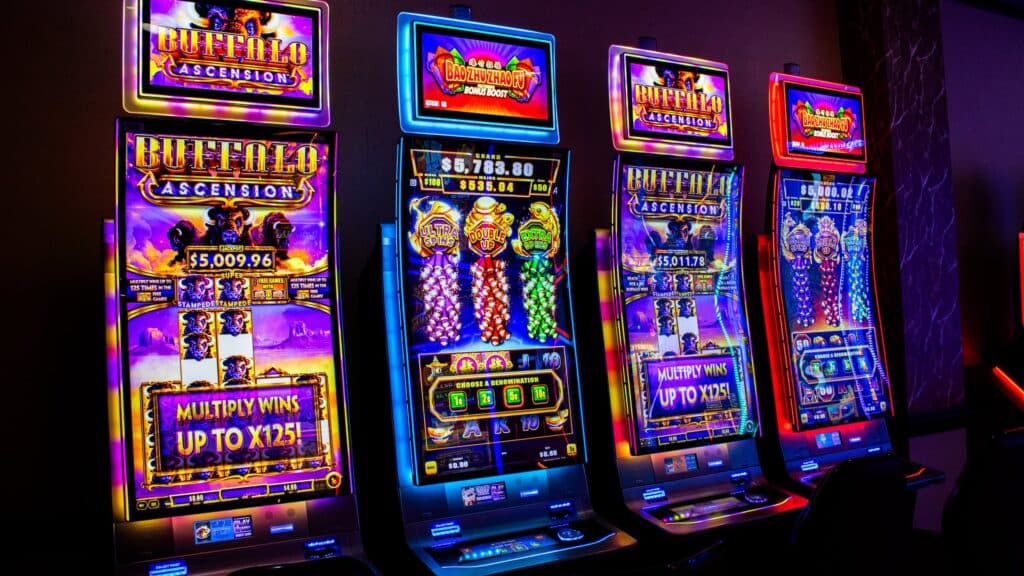Mastering high-stakes slot play is often seen as the pinnacle of casino gambling, attracting those who seek the thrill of significant wins. However, navigating the world of high-stakes slots requires more than just luck; it demands a strategic approach, a deep understanding of the game, and a commitment to responsible gambling. This article delves into the intricacies of high-stakes slot machines, offering a comprehensive guide for both novice and seasoned players aiming to elevate their game. We will explore the mechanics of these games, differentiate myths from realities, discuss effective bankroll management, and emphasize the critical importance of playing responsibly.
Understanding High-Stakes Slot Machines
High-stakes slot machines are distinguished from their regular counterparts primarily by their higher betting limits and potentially larger payouts. These games are designed to cater to players who are comfortable wagering significant amounts per spin, often ranging from several dollars to hundreds or even thousands. The allure of high-stakes slots lies in the amplified excitement and the prospect of hitting substantial jackpots that can be life-changing. However, it’s crucial to recognize that with increased potential rewards comes increased risk. The volatility in high-stakes slots can be considerable, meaning that while big wins are possible, losses can also accumulate rapidly.
To effectively engage with high-stakes slots, understanding the underlying mechanics is essential. Like all modern slot machines, high-stakes versions operate using a Random Number Generator (RNG). This computer algorithm ensures that each spin is entirely independent and random, meaning past outcomes have no influence on future spins. The RNG generates thousands of random numbers per second, and the moment a player presses the spin button, a number is selected, determining the combination of symbols displayed on the reels. This system guarantees fairness and unpredictability, but also underscores that there are no foolproof strategies to predict or manipulate slot outcomes.
Another critical concept is the Return to Player (RTP) percentage. RTP is a theoretical calculation, usually expressed as a percentage, indicating the average amount of money a slot machine will return to players over a vast number of spins. For example, a slot with a 96% RTP theoretically pays back $96 for every $100 wagered over the long run. While RTP can provide an indication of a game's generosity, it's important to remember that this is a long-term average. In the short term, actual returns can deviate significantly due to variance. High-stakes slots typically have RTPs comparable to regular slots, but it's always wise to check the specific RTP of a game before playing, as this information is often available in the game’s help menu or through online casino guides.
Volatility, or variance, is another key characteristic of slot machines, especially relevant in the context of high-stakes play. Volatility refers to the risk level associated with a slot game and how frequently and how much it pays out. High volatility slots, common in the high-stakes category, are characterized by less frequent wins but larger payout sizes when they do occur. Low volatility slots, conversely, offer more frequent but smaller wins. For high-stakes players, understanding volatility is crucial for bankroll management. High volatility slots can lead to periods of extended losses, requiring a larger bankroll to withstand these fluctuations and chase the larger, less frequent wins.
Debunking Slot Machine Myths and Misconceptions
The world of slot machines is rife with myths and misconceptions, and high-stakes slots are no exception. One prevalent myth is the idea of "hot" or "cold" machines. This belief suggests that a slot machine that has recently paid out a large sum is "cold" and less likely to pay again soon, or conversely, a machine that hasn't paid out in a while is "hot" and due for a win. However, due to the RNG, each spin is independent, rendering this concept entirely baseless. Slot machines have no memory of past spins, and the odds of winning remain constant with every play, regardless of previous outcomes.
Another misconception is the notion that certain times of the day or days of the week are more favorable for playing slots. Casinos operate continuously, and the RNG works uniformly around the clock. Payout frequencies are not programmed to change based on time or player volume. The idea that casinos can remotely tighten or loosen slots at will is also largely a myth in regulated markets. Gaming regulations and licensing conditions in most jurisdictions require transparency and fairness, with RNGs and RTPs rigorously tested and certified by independent agencies. While casinos can choose which slot machines to feature and set the RTP within a permitted range, they cannot arbitrarily alter payout percentages in real-time.
Strategy in high-stakes slot play is often misunderstood. Unlike games like poker or blackjack, slot machines are primarily games of chance. There are no skill-based strategies that can guarantee wins. Claims of strategies that promise to beat the slots are generally misleading. However, strategic approaches in slot play are not entirely absent. They revolve around making informed decisions to manage risk and maximize playtime, rather than trying to influence the RNG. This includes selecting games with favorable RTPs, understanding volatility levels, and, most importantly, effective bankroll management. The real strategy in high-stakes slots is about playing smart, not trying to outsmart the machine.
Effective Bankroll Management for High-Stakes Play
For high-stakes slot players, bankroll management is not just a suggestion; it's a necessity for sustainable play. Given the higher stakes and volatility, a robust bankroll management strategy is crucial to mitigate risks and extend playing time. A fundamental principle is to set a budget specifically for gambling and to strictly adhere to it. This budget should be an amount of money that you can afford to lose without impacting your financial stability or personal obligations. Treating gambling as entertainment with a defined cost is a healthy approach.
Dividing your bankroll into sessions is another effective technique. Determine how many gambling sessions you plan to have and allocate a portion of your total bankroll for each session. This helps prevent impulsive overspending in a single session and allows for better control over your gambling habits. For high-stakes play, it’s advisable to have a larger number of smaller sessions rather than fewer sessions with larger sums. This approach can help weather the variance of high volatility slots. For instance, if you have a $3,000 gambling budget for a month, you might divide it into 10 weekly sessions of $300 each, rather than 3 sessions of $1,000.
Setting win and loss limits is a critical component of bankroll management. Before starting a session, decide on a win goal and a loss limit. When you reach either of these thresholds, end the session. Win limits help you secure profits and avoid the temptation to gamble back winnings, while loss limits protect your bankroll from being depleted in a streak of bad luck. For high-stakes play, these limits should be carefully considered in relation to your bankroll and the volatility of the games you are playing. A common strategy is to set a win limit at 50-100% of your session bankroll and a loss limit at 50% of your session bankroll. For example, with a $300 session bankroll, you might aim to stop if you win $150-$300, or if you lose $150.
Understanding bet sizing is also crucial in high-stakes slots. While the allure of maximizing potential payouts by betting the maximum amount is strong, it’s often more prudent to manage bet sizes relative to your bankroll and session goals. Smaller bet sizes can extend playtime and increase the chances of weathering periods of low variance. Conversely, larger bets can deplete a bankroll quickly, especially in high volatility games. Experimenting with different bet sizes can be part of a strategic approach, but always within the confines of your pre-set budget and limits. Consider starting with smaller bets to get a feel for a game’s volatility before increasing stakes.
Psychological Aspects of High-Stakes Gambling
High-stakes gambling, particularly in slots, is deeply intertwined with psychological factors. The excitement of potentially large wins, the adrenaline rush of risk-taking, and the immersive nature of slot machine gameplay can all contribute to a powerful psychological experience. Understanding these aspects is vital for maintaining control and playing responsibly. The "gambler's fallacy," the mistaken belief that past events influence independent future outcomes, is particularly relevant in slot play. Players might believe that after a series of losses, a win is "due," or that a machine is "about to pay out." Recognizing this cognitive bias and remembering the true randomness of slots is essential for rational decision-making.
Emotional regulation plays a significant role in high-stakes gambling. The highs of winning and the lows of losing can evoke strong emotions, which, if unchecked, can lead to impulsive decisions. Chasing losses, for example, is a common pitfall where players attempt to recoup lost money by betting even more, often leading to greater losses. Conversely, overconfidence after a win can lead to reckless betting. Maintaining emotional equilibrium, staying calm and rational regardless of short-term outcomes, is a hallmark of responsible high-stakes play. Techniques such as taking breaks, practicing mindfulness, and being aware of your emotional state can help in managing these psychological pressures.
The environment of casinos, with their stimulating sounds, lights, and social atmosphere, is designed to enhance the gambling experience. For high-stakes players, who may spend extended periods in this environment, it's important to be mindful of how these surroundings can influence behavior. The sensory stimulation can heighten excitement and impulsivity, potentially leading to deviations from pre-set strategies and limits. Being aware of these environmental influences and consciously maintaining focus on your bankroll management plan is crucial. Consider setting time limits for your casino visits and incorporating breaks away from the gaming floor to maintain perspective.
Understanding your motivations for high-stakes slot play is also a key psychological aspect. Are you primarily seeking entertainment, the thrill of risk, or are you hoping to solve financial problems? Gambling should be viewed as a form of entertainment, not a source of income or a solution to financial difficulties. If gambling is becoming a way to escape stress, negative emotions, or financial pressures, it may be indicative of a problematic relationship with gambling. Self-awareness and honest self-assessment are crucial. If you find yourself gambling for reasons beyond entertainment, seeking support and resources for responsible gambling is advisable.
Responsible Gambling in High-Stakes Environments
Given the inherent risks of high-stakes slot play, a steadfast commitment to responsible gambling is paramount. Responsible gambling is not just about avoiding problem gambling; it’s about ensuring gambling remains a safe and enjoyable form of entertainment. Setting and adhering to personal limits is the cornerstone of responsible play. This includes not only financial limits (budgets, session limits, win/loss limits) but also time limits. Decide in advance how much time you will spend gambling and stick to it. Time limits help prevent excessive play and maintain balance in your overall lifestyle.
Being aware of the signs of problem gambling is crucial for high-stakes players. Problem gambling, or gambling disorder, is characterized by compulsive gambling behavior that leads to significant negative consequences in various areas of life. Signs can include increasing preoccupation with gambling, needing to gamble with larger amounts of money to achieve the desired excitement, repeated unsuccessful efforts to control or stop gambling, restlessness or irritability when attempting to reduce or stop gambling, gambling to escape from problems or relieve negative emotions, lying to conceal the extent of gambling involvement, and jeopardizing or losing significant relationships, job, or educational opportunities because of gambling. If you recognize any of these signs in yourself or someone you know, it’s important to seek help.
Numerous resources are available for individuals who may be experiencing gambling problems. Non-profit organizations like the National Council on Problem Gambling (NCPG) and Gamblers Anonymous (GA) offer support, resources, and treatment options. Websites like responsiblegambling.org provide information and tools for responsible gambling practices. Many casinos also offer responsible gambling programs and self-exclusion options, allowing individuals to ban themselves from the premises. Utilizing these resources and seeking support is a sign of strength and responsibility, ensuring that gambling remains a controlled and enjoyable activity.
Seeking help is a crucial step if gambling becomes problematic. Talking to a trusted friend, family member, or professional counselor can be a starting point. Gambling helplines and online resources offer confidential support and guidance. Remember, problem gambling is a recognized behavioral addiction, and like other health issues, it requires professional intervention. Early intervention is key to preventing more severe consequences and regaining control. Embracing responsible gambling practices and knowing when and where to seek help are the most strategic moves a high-stakes slot player can make, ensuring the longevity and enjoyment of the game without compromising personal well-being.
Conclusion: Playing Smart in the High-Stakes Slot Arena
Mastering high-stakes slot play is less about finding a mythical winning strategy and more about adopting a strategic mindset focused on informed decision-making, robust bankroll management, and unwavering responsible gambling practices. While the allure of substantial jackpots is undeniable, it's crucial to approach high-stakes slots with a clear understanding of the risks involved, the mechanics of the games, and the psychological factors at play. By debunking common myths, implementing effective bankroll strategies, and staying attuned to the psychological aspects of gambling, players can navigate the high-stakes environment more skillfully and responsibly. Ultimately, the most successful approach to high-stakes slot play is one that prioritizes enjoyment and control, ensuring that the pursuit of excitement does not come at the cost of financial or personal well-being. The true mastery lies not in beating the odds, which are inherently stacked in favor of the house, but in playing smart, staying informed, and always gambling responsibly.
External Resources:



